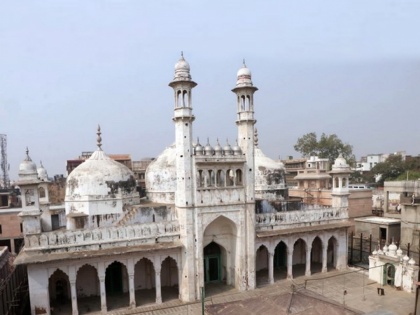Gyanvapi Mosque Case: Varanasi Court Allows Hindu Side To Worship Inside Masjid’s Sealed Basement
By Lokmat English Desk | Published: January 31, 2024 03:32 PM2024-01-31T15:32:48+5:302024-01-31T15:32:55+5:30
A Varanasi court on Wednesday, January 31, allowed the Hindu side to worship inside the sealed basement of Gyanvapi ...

Gyanvapi Mosque Case: Varanasi Court Allows Hindu Side To Worship Inside Masjid’s Sealed Basement
A Varanasi court on Wednesday, January 31, allowed the Hindu side to worship inside the sealed basement of Gyanvapi mosque. The court ordered Hindu devotees to offer prayers at 'Vyas Ka Tekhana', a sealed area inside Varanasi's Gyanvapi masjid. During its hearing earlier in the day, the court also directed the district administration to make the necessary arrangements for the same within the next seven days.
Advocate Vishnu Shankar Jain, representing the Hindu side, stated, "Puja will start within seven days. Everyone will have the right to perform Puja." "The Hindu side is allowed to offer prayers at 'Vyas Ka Tekhana'. The District Administration will have to make arrangements within 7 days," said Hindu side lawyer, Advocate Subhash Nandan Chaturvedi.
Gyanvapi Case: Varanasi Court Allows Hindu Side To Worship Inside Masjid’s Sealed Basement.
— Lokmat Times (@lokmattimeseng) January 31, 2024
Watch 📽️#GyanvapiMosque#GyanvapiMasjid#Varanasipic.twitter.com/UfgO6syTF0
Earlier on Monday (January 29), Hindu plaintiffs in Varanasi’s Gyanvapi case moved an application before the Supreme Court seeking directions to the Archaeological Survey of India (ASI) to survey the 'Shivling' and entire 'wazukhana' (ablution pond) area of the mosque area – which had remained sealed since May 2022.
The ‘wazukhana’, the place where Muslims perform ablution before offering prayers, was sealed by the Supreme Court in 2022, pending the ASI’s survey of the mosque premises. The Hindu side, represented by advocate Vishnu Shankar Jain, filed an application to lift the stay order and allow the ASI to conduct another survey in the ‘wazukhana’ area, without damaging the ‘Shivling’.
Jain stated that the ASI should be given permission to study the ‘wazukhana’ area, as it would reveal whether it is a fountain or a ‘Shivling’. “I have filed an application in the Supreme Court asking to vacate the stay order given on 19 May 2023. ASI should be allowed to conduct a study and feature study of the ‘Wazukhana’ area. Only, after the study it will be known if it is a fountain or a Shivling,” he said.
ASI Survey Report:
On January 26, the Archaeology Department of India (ASI) released a report stating that there was a Hindu temple at the site of the Gyanvapi Mosque in Varanasi, India. The report is based on a survey of the mosque using ground-penetrating radar (GPR) technology, which revealed the presence of a well in the north hall of the mosque. The report also claims that the western wall of the mosque is the remains of the Hindu temple and that the pillars of the mosque were originally part of the Hindu temple.
The ASI report also mentions that inscriptions in Devanagari, Telugu, and Kannada languages have been found in the Gyanvapi area. These inscriptions, along with the symbols of Hindu gods and goddesses found on the pillars of the mosque, are considered strong evidence of a Hindu temple at the site. The report concludes that the present construction of the Gyanvapi Mosque was built using pillars and plaster from the original Hindu temple.
Open in app